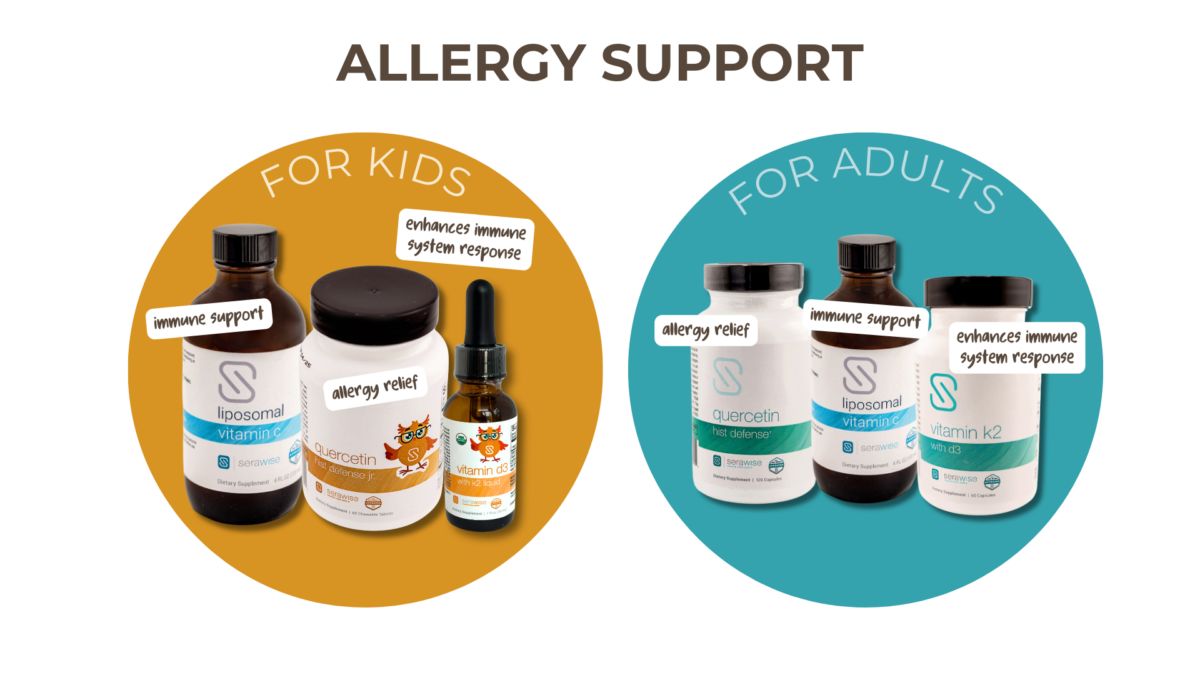Disclaimer: The information provided in this article is for educational and informational purposes only and is not a substitute for professional medical advice. Always consult with a qualified healthcare provider before making any changes to your home environment, diet, or health routine, especially if you or a family member have respiratory conditions, allergies, or other health concerns.
If your family spends spring battling sneezes, itchy eyes, and endless tissues, you’re not alone. Seasonal allergies can turn a beautiful day into a miserable one. But what if there was a natural way to help your body fight back? Enter quercetin, a powerful plant-based compound that’s gaining attention for its potential to ease allergy symptoms.
What Is Quercetin?
Quercetin is a flavonoid, a type of antioxidant found in many fruits, vegetables, and herbs. It’s particularly abundant in apples, onions, berries, and leafy greens. But while you can get quercetin from food, many people turn to quercetin supplements for a concentrated dose, especially during allergy season (Li et al., 2016).

Read More:10 Alternative Allergy Medicines for Kids
How Quercetin Helps with Seasonal Allergies
Quercetin works by stabilizing mast cells, the immune cells responsible for releasing histamine—the compound behind those annoying allergy symptoms like sneezing, congestion, and itchy eyes. Studies suggest that quercetin may act as a natural antihistamine, reducing the body’s allergic response (Mlcek et al., 2016).
In addition to blocking histamine release, quercetin has anti-inflammatory properties that help soothe irritated airways and may even improve lung function in those with allergic asthma (Rogerio et al., 2010). Research also suggests that quercetin reduces cytokine production, which helps regulate immune responses and further control allergic reactions (Vollmannová et al., 2024).

Looking for more natural ways to tackle allergy season?
Click here for additional remedies and solutions!
Why Absorption Matters: The Role of Bromelain and NAC
While food sources of quercetin are beneficial, they may not provide enough to make a noticeable difference for allergy sufferers. That’s where quercetin supplements come in. However, quercetin is not easily absorbed by the body on its own.
Studies show that bromelain, an enzyme from pineapple, enhances quercetin absorption while also providing additional anti-inflammatory effects (Vollmannová et al., 2024).
Another key ingredient that works alongside quercetin is NAC (N-acetyl cysteine). NAC helps thin mucus and supports detox pathways, making it an effective addition to any allergy relief routine, especially for those dealing with congestion or sinus pressure.
Best Way to Take Quercetin Supplements for Seasonal Allergies
- Follow the Right Dosage: Research suggests that quercetin is effective in doses ranging from 500–1000 mg per day, split into two doses (Mlcek et al., 2016). However, the ideal dosage can vary based on individual needs and supplement formulations. Our Allergy Support Bundle provides a carefully balanced blend of quercetin, bromelain, NAC, and stinging nettle, designed for optimal seasonal allergy support—check our product page for exact dosage recommendations. As always, consult your healthcare provider before starting any new supplement, especially if you have underlying conditions or take medications.
- Take with Food: Quercetin is best absorbed when taken with meals that contain healthy fats, like avocado, nuts, or olive oil.
- Look for Bromelain & NAC: Many high-quality quercetin supplements, including our Allergy Support Bundle for kids and adults, pair quercetin with bromelain to enhance absorption and NAC to support mucus clearance, making it an effective choice for allergy relief.

Get My Free Spring Allergy Survival Guide
Spring allergies don’t have to take over your life! This free guide will help you tackle sneezes, itchy eyes, and stuffy noses with practical and natural solutions.
Click here to download your free guide and start feeling better today!
A Smarter Approach to Allergy Relief
If you’re looking for a natural way to manage seasonal allergies, quercetin could be a great addition to your routine. With its ability to stabilize mast cells, reduce histamine release, lower inflammation, and support immune balance, this flavonoid offers powerful relief without the drowsiness of traditional antihistamines.
Our Seasonal Allergy Support Pack is expertly formulated to provide targeted relief from seasonal symptoms. It features our Serawise Quercetin blend—a powerful combination of quercetin, bromelain, stinging nettle, vitamin C, and NAC—to help reduce histamines, calm inflammation, and support gut health. Plus, the pack also includes Vitamin D and Liposomal Vitamin C for comprehensive immune support and long-term allergy relief.
References
Li, Y., Yao, J., Han, C., Yang, J., Chaudhry, M. T., Wang, S., & Yin, Y. (2016). Quercetin, inflammation, and immunity. Nutrients, 8(3), 167. https://doi.org/10.3390/nu8030167
Mlcek, J., Jurikova, T., Skrovankova, S., & Sochor, J. (2016). Quercetin and its anti-allergic immune response. Molecules, 21(5), 623. https://doi.org/10.3390/molecules21050623
Rogerio, A. P., Dora, C. L., Andrade, E. L., Chaves, J. S., Silva, L. F., Lemos-Senna, E., & Calixto, J. B. (2010). Quercetin inhibits airway inflammation and hyperresponsiveness in allergic asthma. European Journal of Pharmacology, 649(1-3), 241-246. https://doi.org/10.1016/j.ejphar.2010.09.015
Vollmannová, A., Tóth, T., Bojňanská, T., & Ďuračková, Z. (2024). Quercetin in allergic responses and immune modulation: A systematic review. Frontiers in Immunology, 15, 123456. https://doi.org/10.3389/fimmu.2024.123456






